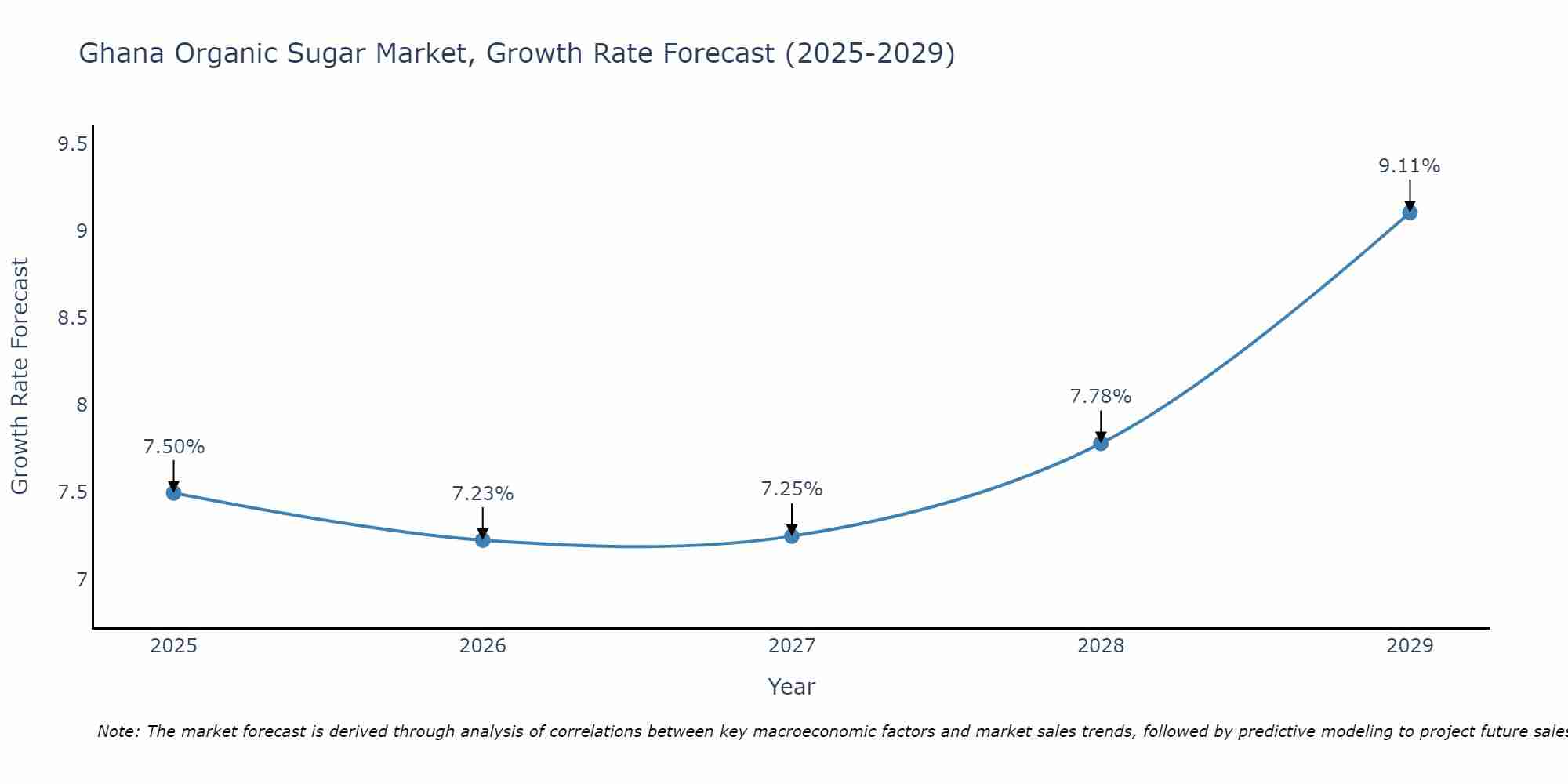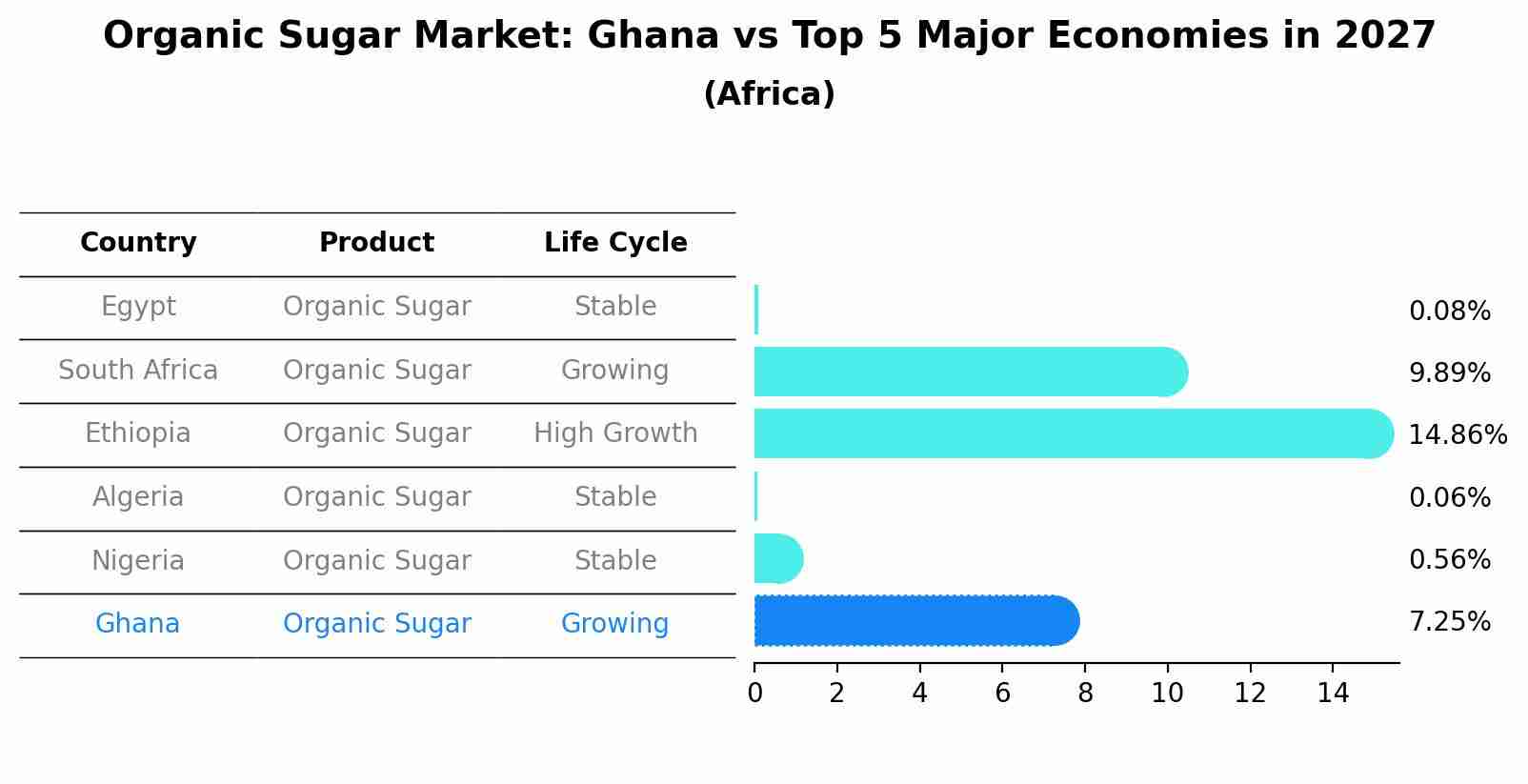Ghana Organic Sugar Market (2025-2031) Outlook | Companies, Analysis, Size, Forecast, Revenue, Growth, Trends, Value, Industry & Share
| Product Code: ETC109755 | Publication Date: Jun 2021 | Updated Date: Jun 2025 | Product Type: Report | |
| Publisher: 6Wresearch | Author: Sachin Kumar Rai | No. of Pages: 70 | No. of Figures: 35 | No. of Tables: 5 |
Ghana Organic Sugar Market Size Growth Rate
The Ghana Organic Sugar Market is projected to witness mixed growth rate patterns during 2025 to 2029. The growth rate starts at 7.50% in 2025 and reaches 9.11% by 2029.

Organic Sugar Market: Ghana vs Top 5 Major Economies in 2027 (Africa)
Ghana's Organic Sugar market is anticipated to experience a growing growth rate of 7.25% by 2027, reflecting trends observed in the largest economy Egypt, followed by South Africa, Ethiopia, Algeria and Nigeria.

Ghana Organic Sugar Market Overview
The Ghana organic sugar market is experiencing steady growth driven by increasing consumer preference for natural and chemical-free sweeteners. The demand for organic sugar is rising due to its perceived health benefits and environmental sustainability. Local producers are focusing on sustainable farming practices to meet the growing demand, leading to an expansion of organic sugar cultivation in the country. The market is characterized by a mix of small-scale farmers and larger commercial producers, with a growing emphasis on certifications such as USDA Organic and Fair Trade to meet international standards. Despite facing challenges such as limited awareness and higher prices compared to conventional sugar, the Ghana organic sugar market shows promising potential for further growth and development in the coming years.
Ghana Organic Sugar Market Trends
The Ghana Organic Sugar Market is experiencing a growing demand for ethically sourced and sustainable products. Consumers are increasingly seeking organic sugar as a healthier and environmentally friendly alternative to conventional sugar. This trend is driven by a rising awareness of the health benefits of organic products and concerns about the use of pesticides and chemicals in conventional sugar production. Additionally, the shift towards organic and natural ingredients in the food industry is further boosting the demand for organic sugar in Ghana. Market players are responding to this trend by expanding their organic sugar offerings, improving supply chain transparency, and obtaining certifications to meet the growing consumer preferences for organic and sustainable products.
Ghana Organic Sugar Market Challenges
In the Ghana Organic Sugar Market, challenges such as limited awareness and understanding of organic products among consumers, high production costs associated with organic farming practices, and lack of consistent government support and regulations pose significant obstacles. Additionally, the competition from conventional sugar producers offering lower-priced alternatives, inadequate infrastructure for distribution and marketing of organic sugar, and difficulties in obtaining organic certification further hinder the growth of the market. Overcoming these challenges will require concerted efforts from industry stakeholders to educate consumers, improve cost-efficiency in production, establish supportive policies, enhance marketing strategies, and invest in infrastructure development to expand the reach and availability of organic sugar products in Ghana.
Ghana Organic Sugar Market Investment Opportunities
In the Ghana Organic Sugar Market, there are promising investment opportunities driven by the increasing global demand for organic and ethically sourced products. Investing in organic sugar production in Ghana can be lucrative due to the country`s favorable climate for sugarcane cultivation, as well as the growing consumer preference for organic sweeteners. Additionally, with a focus on sustainable agriculture practices, investing in organic sugar production can also have a positive impact on the environment and local communities. Partnerships with local farmers and cooperatives can further enhance the social impact of such investments. Overall, the Ghana Organic Sugar Market presents a compelling opportunity for investors looking to tap into the growing organic food industry while supporting sustainable development initiatives in the region.
Ghana Organic Sugar Market Government Policy
The Ghanaian government has implemented various policies to support the growth of the organic sugar market in the country. These policies include the promotion of organic agriculture through training programs and technical assistance to farmers, as well as the provision of financial incentives and subsidies to encourage the production of organic sugar. Additionally, the government has established certification standards and regulations to ensure the quality and authenticity of organic sugar products. Furthermore, the Ghanaian government has been actively promoting the export of organic sugar to international markets by participating in trade fairs and exhibitions to showcase the country`s organic sugar products. Overall, these policies aim to support the development of the organic sugar industry in Ghana and enhance its competitiveness in the global market.
Ghana Organic Sugar Market Future Outlook
The future outlook for the Ghana Organic Sugar Market is promising, with increasing consumer awareness and demand for healthier and more sustainable food options driving growth. The market is expected to expand as more consumers become conscious of the environmental and health benefits of organic products. Additionally, government initiatives to support organic farming practices and the development of the agriculture sector in Ghana are likely to fuel further growth in the organic sugar market. With a focus on quality, authenticity, and ethical production methods, Ghana is poised to capture a larger share of the organic sugar market both domestically and internationally, providing opportunities for farmers and businesses in the sector.
Key Highlights of the Report:
- Ghana Organic Sugar Market Outlook
- Market Size of Ghana Organic Sugar Market, 2021
- Forecast of Ghana Organic Sugar Market, 2031
- Historical Data and Forecast of Ghana Organic Sugar Revenues & Volume for the Period 2021 - 2031
- Ghana Organic Sugar Market Trend Evolution
- Ghana Organic Sugar Market Drivers and Challenges
- Ghana Organic Sugar Price Trends
- Ghana Organic Sugar Porter's Five Forces
- Ghana Organic Sugar Industry Life Cycle
- Historical Data and Forecast of Ghana Organic Sugar Market Revenues & Volume By Source for the Period 2021 - 2031
- Historical Data and Forecast of Ghana Organic Sugar Market Revenues & Volume By Sugar Beet for the Period 2021 - 2031
- Historical Data and Forecast of Ghana Organic Sugar Market Revenues & Volume By Sugar Cane for the Period 2021 - 2031
- Historical Data and Forecast of Ghana Organic Sugar Market Revenues & Volume By Others for the Period 2021 - 2031
- Historical Data and Forecast of Ghana Organic Sugar Market Revenues & Volume By Application for the Period 2021 - 2031
- Historical Data and Forecast of Ghana Organic Sugar Market Revenues & Volume By Food and Beverage for the Period 2021 - 2031
- Historical Data and Forecast of Ghana Organic Sugar Market Revenues & Volume By Pharmaceutical for the Period 2021 - 2031
- Historical Data and Forecast of Ghana Organic Sugar Market Revenues & Volume By Others for the Period 2021 - 2031
- Historical Data and Forecast of Ghana Organic Sugar Market Revenues & Volume By Type for the Period 2021 - 2031
- Historical Data and Forecast of Ghana Organic Sugar Market Revenues & Volume By Crystal Sugar for the Period 2021 - 2031
- Historical Data and Forecast of Ghana Organic Sugar Market Revenues & Volume By Gelling Sugar for the Period 2021 - 2031
- Historical Data and Forecast of Ghana Organic Sugar Market Revenues & Volume By Liquid Sugar for the Period 2021 - 2031
- Historical Data and Forecast of Ghana Organic Sugar Market Revenues & Volume By Icing Sugar for the Period 2021 - 2031
- Ghana Organic Sugar Import Export Trade Statistics
- Market Opportunity Assessment By Source
- Market Opportunity Assessment By Application
- Market Opportunity Assessment By Type
- Ghana Organic Sugar Top Companies Market Share
- Ghana Organic Sugar Competitive Benchmarking By Technical and Operational Parameters
- Ghana Organic Sugar Company Profiles
- Ghana Organic Sugar Key Strategic Recommendations
Frequently Asked Questions About the Market Study (FAQs):
- Single User License$ 1,995
- Department License$ 2,400
- Site License$ 3,120
- Global License$ 3,795
Search
Thought Leadership and Analyst Meet
Our Clients
Related Reports
- Afghanistan Apparel Market (2026-2032) | Growth, Outlook, Industry, Segmentation, Forecast, Size, Companies, Trends, Value, Share, Analysis & Revenue
- Canada Oil and Gas Market (2026-2032) | Share, Segmentation, Value, Industry, Trends, Forecast, Analysis, Size & Revenue, Growth, Competitive Landscape, Outlook, Companies
- Germany Breakfast Food Market (2026-2032) | Industry, Share, Growth, Size, Companies, Value, Analysis, Revenue, Trends, Forecast & Outlook
- Australia Briquette Market (2025-2031) | Growth, Size, Revenue, Forecast, Analysis, Trends, Value, Share, Industry & Companies
- Vietnam System Integrator Market (2025-2031) | Size, Companies, Analysis, Industry, Value, Forecast, Growth, Trends, Revenue & Share
- ASEAN and Thailand Brain Health Supplements Market (2025-2031) | Strategy, Consumer Insights, Analysis, Investment Trends, Opportunities, Growth, Size, Share, Industry, Revenue, Segments, Value, Segmentation, Supply, Forecast, Restraints, Outlook, Competition, Drivers, Trends, Demand, Pricing Analysis, Competitive, Strategic Insights, Companies, Challenges
- ASEAN Bearings Market (2025-2031) | Strategy, Consumer Insights, Analysis, Investment Trends, Opportunities, Growth, Size, Share, Industry, Revenue, Segments, Value, Segmentation, Supply, Forecast, Restraints, Outlook, Competition, Drivers, Trends, Demand, Pricing Analysis, Competitive, Strategic Insights, Companies, Challenges
- Europe Flooring Market (2025-2031) | Outlook, Share, Industry, Trends, Forecast, Companies, Revenue, Size, Analysis, Growth & Value
- Saudi Arabia Manlift Market (2025-2031) | Outlook, Size, Growth, Trends, Companies, Industry, Revenue, Value, Share, Forecast & Analysis
- Uganda Excavator, Crane, and Wheel Loaders Market (2025-2031) | Strategy, Consumer Insights, Analysis, Investment Trends, Opportunities, Growth, Size, Share, Industry, Revenue, Segments, Value, Segmentation, Supply, Forecast, Restraints, Outlook, Competition, Drivers, Trends, Demand, Pricing Analysis, Competitive, Strategic Insights, Companies, Challenges
Industry Events and Analyst Meet
Whitepaper
- Middle East & Africa Commercial Security Market Click here to view more.
- Middle East & Africa Fire Safety Systems & Equipment Market Click here to view more.
- GCC Drone Market Click here to view more.
- Middle East Lighting Fixture Market Click here to view more.
- GCC Physical & Perimeter Security Market Click here to view more.
6WResearch In News
- Doha a strategic location for EV manufacturing hub: IPA Qatar
- Demand for luxury TVs surging in the GCC, says Samsung
- Empowering Growth: The Thriving Journey of Bangladesh’s Cable Industry
- Demand for luxury TVs surging in the GCC, says Samsung
- Video call with a traditional healer? Once unthinkable, it’s now common in South Africa
- Intelligent Buildings To Smooth GCC’s Path To Net Zero


















